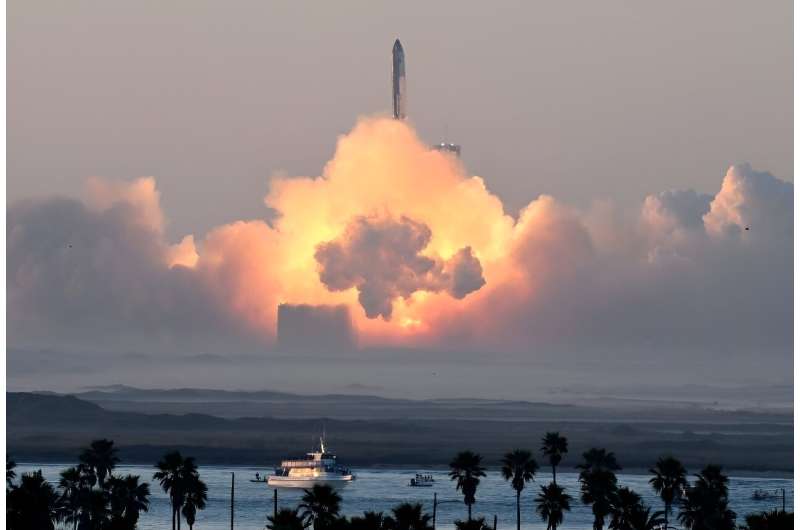SpaceX Plans Next Starship Test Launch for March 14

March 6, 2024
The information provided in this article has undergone a stringent review based on the editorial standards and guidelines of Science X. The article possesses the following key characteristics that the editors have emphasized on to ensure its reliability:
- It has been fact-checked
- It originates from a reputable news agency
- It has been thoroughly proofread
SpaceX, the space exploration company founded by Elon Musk, issued a statement on Wednesday highlighting March 14 as the potential date for the forthcoming test launch of the colossal Starship rocket. The aspiration behind this endeavor is to eventually establish settlements on Mars.
The last two trials concluded in dramatic explosions, compelling the company to implement a swift sequence of trials and corrections to fast-track progress.
'The third launch test of Starship could be anticipated to take place as soon as March 14, contingent on the obtainment of regulatory sanction,' unveiled SpaceX on X, Musk's own social media platform.
The official declaration on their website conveyed that the rocket, scheduled for launch from Boca Chica, Texas, would conclude its flight with a splashdown in the Indian Ocean.
Under NASA's mandate to execute a lunar mission with US astronauts in 2026, a modified version of the Starship needs to be certified and prepped for usage as a lander.
The Starship's two stages, when assembled, result in the rocket standing at an impressive 397 feet (121 meters) tall—90 feet taller than the Statue of Liberty. With its Super Heavy Booster generating a 16.7 million pounds (74.3 Meganewtons) of thrust, it easily outperforms NASA's Space Launch System (SLS), the world's second mightiest rocket.
The initial flight test of the Starship in April 2023 led SpaceX to detonate it due to an issue with the separation of the two stages, four minutes following its launch.
The subsequent test in November 2023 concluded with successful separation of the booster, although both components ultimately exploded over the sea.
The Federal Aviation Administration (FAA) revoked its ongoing investigation into the incident, post the identification of 17 remedial actions that SpaceX would need to implement prior to attaining approval for subsequent launches.
The 'rapid iterative development' approach employed by SpaceX has rewarded the company significantly and its other rockets have also procured substantial trust from NASA and private sector.
However, the clock is ticking for Starship, as it needs to be ready for NASA's lunar missions and the US could potentially risk falling behind its competitor China, which endeavors to execute a manned lunar landing by 2030.
SpaceX is not only obliged to demonstrate successful launch, flight, and landing of Starship but also needs to prove its capability of placing multiple 'Starship tankers' in orbit for refuelling at extremely low temperatures, a primary Starship based in Earth's orbit for the onwards voyage to the moon.
© 2024 AFP




